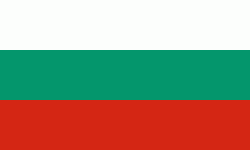Rakovski (Obshtina Rakovski)
Rakovski (Раковски ) is a town in southern Bulgaria, in the historical region of Thrace. It is located in the Plovdiv Province. The town is also the centre of the Rakovski Municipality. Rakovski was founded in 1966 with the merging of three villages — General Nikolaevo, Sekirovo and Parchevich. The new town was named after the prominent Bulgarian revolutionary Georgi Sava Rakovski.
The town is located in the western part of the Upper Thracian Lowland, at 25 km to the northeast of Bulgaria's second largest city Plovdiv, and has an area of 5,50 km2. Rakovski is located in a transitional continental climatic zone south of Stara Planina. The summers are hot and dry and the winters are mild, with snow remaining for about a month.
The town is located in the western part of the Upper Thracian Lowland, at 25 km to the northeast of Bulgaria's second largest city Plovdiv, and has an area of 5,50 km2. Rakovski is located in a transitional continental climatic zone south of Stara Planina. The summers are hot and dry and the winters are mild, with snow remaining for about a month.
Map - Rakovski (Obshtina Rakovski)
Map
Country - Bulgaria
 |
 |
| Flag of Bulgaria | |
One of the earliest societies in the lands of modern-day Bulgaria was the Neolithic Karanovo culture, which dates back to 6,500 BC. In the 6th to 3rd century BC the region was a battleground for ancient Thracians, Persians, Celts and Macedonians; stability came when the Roman Empire conquered the region in AD 45. After the Roman state splintered, tribal invasions in the region resumed. Around the 6th century, these territories were settled by the early Slavs. The Bulgars, led by Asparuh, attacked from the lands of Old Great Bulgaria and permanently invaded the Balkans in the late 7th century. They established the First Bulgarian Empire, victoriously recognised by treaty in 681 AD by the Eastern Roman Empire. It dominated most of the Balkans and significantly influenced Slavic cultures by developing the Cyrillic script. The First Bulgarian Empire lasted until the early 11th century, when Byzantine emperor Basil II conquered and dismantled it. A successful Bulgarian revolt in 1185 established a Second Bulgarian Empire, which reached its apex under Ivan Asen II (1218–1241). After numerous exhausting wars and feudal strife, the empire disintegrated and in 1396 fell under Ottoman rule for nearly five centuries.
Currency / Language
| ISO | Currency | Symbol | Significant figures |
|---|---|---|---|
| BGN | Bulgarian lev | лв | 2 |
| ISO | Language |
|---|---|
| BG | Bulgarian language |
| TR | Turkish language |















